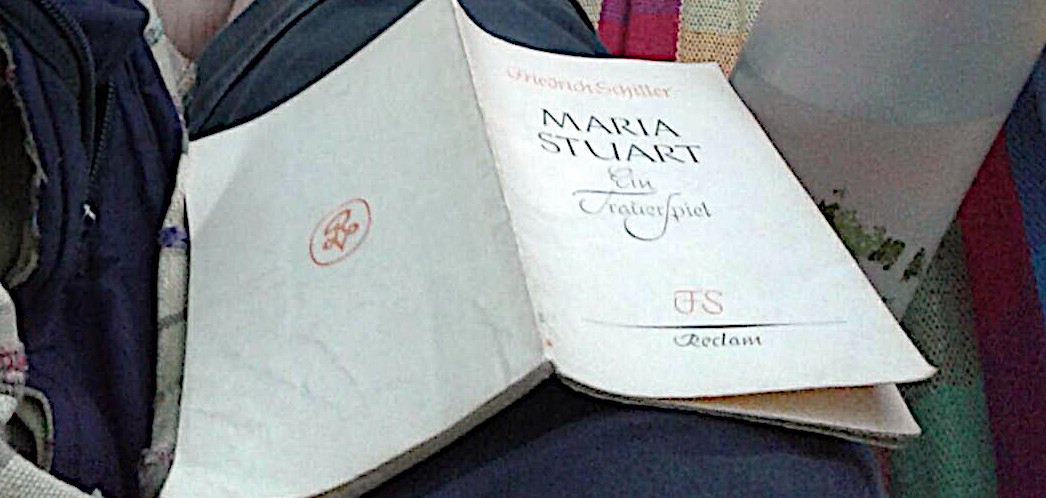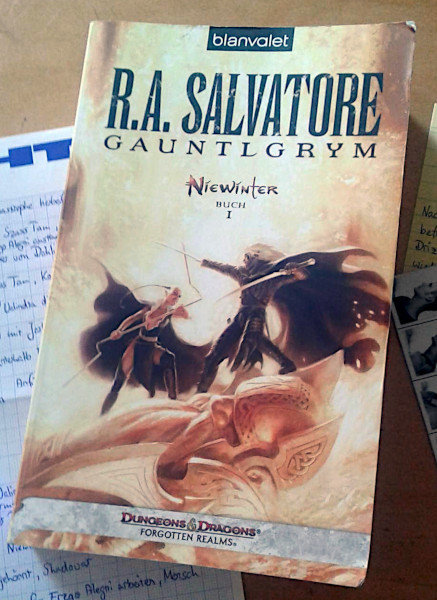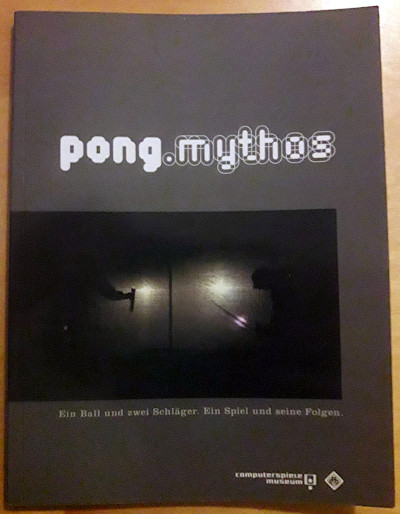Books I've read in 2023

Here are some short remarks about most of the books I've read during the last year.
Numenera (2017) by Monte Cook
Uhrwerk Verlag
This was the first time I've read a role playing game's source and rulebook from the first page to the last. I really love the premise of the universe with those many fallen civilizations leading to a world in a medieval-like state with remnants of the past scattered everywhere. It's interesting to imagine people living there who simply can't make sense of what's all around them and still live their lives as best they can.
That said about the premise I found the world as developed in the book a bit underwhelming. It presents a nice, imaginative subject, but then every boring RPG trope in existence is stamped carelessly on it. I think there was a big chance to create something truely amazing they missed there.
The rules are okay I guess. I haven't actually played it yet except for the amazing video game - Torment: Tides of Numenera. So I can't really judge this. They tell you in the book many times that the emphasis is clearly on the role playing part instead of following each rule application meticulously.
One thing I find difficult to imagine it that they tell you, as a game manager to give lots of items and time-limited abilities to the players. Wouldn't that theoretically make a character quite "unstable" - I mean wouldn't that mean that the characters play differently every other session and that the individual character development wouldn't mean a whole lot? I expect this would also lead to characters with unpredictable strength - that again would make it hard to lead a game.
The art in the book was solid and mostly fitting to the setting. I often had the impression that someone had made a great drawing and then an author wrote an unimaginative scenario into it.
Flow - The Psychology of Optimal Experience (1990) by Mikaly Czikszentmihalyi
Harper Perennial
I can only recommend reading this book. It describes the state in which you can enjoy the things you do moment-to-moment and give meaning to your life as a whole. The mindset and the environment that is necessary to reach this state are explained very well here by using a digestible language for the psychological concepts at play.
In my experience most of those guidebooks only "help" those that already do what is being recommended in them. But here I think you can actually get some input for how to make your life more enjoyable - if only in some situations.
Maria Stuart - Ein Trauerspiel (1800) by Friedrich Schiller
Reclam Universalbibliothek (Nr. 64)

The story dates back to a time when intrigue, betrayal and murdering your opponents was still the domain of the monarchy and not of dictators and despots. In general, the play was a good read. I like how those old plays sometimes let you dive into the past in two stages: A person from 200 years ago tells with his play a story from yet again more than 100 years earlier.
Gauntlgrym - Niewinter - Band 1 (2010) by R. A. Salvatore

Blavalent (Nr. 26851)
A novel in the Dungeons & Dragons universe. As far as I know the books by R. A. Salvatore are highly praised and I agree that this story is intriguing enough to keep on reading. But what put me off at times, however, was the large amount of detailed description of intense violence. In contrast to that was the oversexualization of some characters in descriptions and acting. I guess this is the legacy of old RPG times. I could do without that.
Also, there were so many characters with fantasy names that I actually had to make a cheat sheet of them and their role in the story.
Führer durch die Ausgrabungsstätten in Ostia Antica mit einem Abschnitt über das Renaissance-Dorf (2000) by Sonia Gallico
ATS Italia Editrice
I visited the ruins of Ostia Antica in 2009, but arrived there late in the afternoon and only had a short rush through the remains of the old roman town. By chance I found this guidebook and could in retrospect understand and appreciate what I had actually seen there more than a decade ago. It was interesting to follow the rise and fall of such a big town and read about what kind of society lived there.
Draussen vor der Tür (1946) by Wolfgang Borchert
Rowohlt Taschenbuch Verlag (Nr. 22509)
After a few pages of reading through this play's script I realized that I had already read it some years ago. Still, I kept reading because of the strange language and the strange characters, for example the talking river Elbe or the "Other one" or Death himself with a hiccup. It paints a painful image of the period after the war. And that made a big impression on me.
The subtext reads: "A play that no theatre wants to play and no audience wants to see." But here I think it's not about wanting to be confronted with it, but about having to be confronted with it.
Prinz Friedrich von Homburg (1810) by Heinrich von Kleist
Reclam Universalbibliothek (Nr. 178)
An old play about a 100 year old story - again. This was strange in that the protagonist was very unlikable and even though it read like a typical drama it had an unexpected happy ending. I didn't like it too much.
Der Gefangene des Himmels (2011, English: The Prisoner of Heaven) by Carlos Ruiz Zafón
Fischer Verlag (Nr. 19585)
The final piece of his Barcelona trilogy. And again as thrilling and bitter as the other novels. Zafón manages to create characters that keep you interested in but also those that disgust you to the bones. Unfortunately as it was so long since I've read the other two books I didn't remember many of the connections and only vaguely got the revelations concerning past story threads. What bothered me were the sexual references in every other paragraph especially in the beginning - this didn't really serve the story or the characters.
I think he wanted to end the reading experience of the trilogy on a positive note. That means in the final quarter of the book everything starts to just work out fine. I can understand this and don't want to criticise a few positive chapters but this shift in tone was kind of obvious.
pong.mythos (2006) by Andreas Lange

Förderverein für Jugend und Sozialarbeit
This is actually a booklet to an exposition about the video game Pong. It describes the context in which the game was created, both from a historical and technical point of view and shows how it has since been taken up in media and arts. In short: How it has become a myth.
Most fascinating to me was how imaginative the processing of the theme Pong was in the arts. This was quite inspiring.
Samarkand (2001) by Olga Kharitidi
List Taschenbuch (Nr. 60855)
It's hard for me to read this as a literal, biographical text because the mysticism described is a bit too unbelievable. But it was interesting in itself to delve into the history, culture, myths and legends of Uzbekistan.
To the Lighthouse (1927) by Virginia Woolf

Wordsworth Classic
The struggle of the Ramsey family. This story's atmosphere is just pitch black and most depressing. I think this is linguistically the most difficult English book I've ever read. Adding to this its unconventional style, I had at times now clue what a paragraph was about. Still it was a worthwhile experience for me.
Der Fliegende Holländer (1841) by Richard Wagner
Reclam Universalbibliothek (Nr. 5635)
How does one come up with the idea of reading the script of an opera? - Yes!
Nothing much to say about this - it takes 20 minutes to read something that singers and an orchestra would spend more than 2 hours on. Afterwards I found this recording of a modern adaptation, performed at the Bayreuther Festspiele 2021.
Harry Potter and the Deathly Hallows (2007) by J. K. Rowling
Bloomsbury Children's Books
I'm finally through with the series. As with all the previous stories this one kept me reading chapter after chapter. Some new story lines emerged in this entry that wouldn't have felt a bit disconnected if they had been hinted at earlier in the series. I mean especially the whole backstory of Dumbledor.
There is one pattern that repeats itself throughout the book: The protagonists don't know what to do, then out of desperation they do something reckless, get into trouble, barely manage to get to safety again and have not made any progress at all. But I guess this is how you fullfil a prophecy.
I think one can see that it's the book to wrap things up and it does so quite well.
Emilia Galotti (1772) by Gotthold Ephraim Lessing
Reclam Universalbibliothek (Nr. 45)
Nothing too special about this play. It's the oldest work I've read in 2023 and it's also the shortest in scope - everything happens in just one day. The story is more exciting than I initially expected.
GEO Epoche - Irland (2018) by Michael Schaper

Gruner + Jahr Verlag
A magazine with articles about the history of Ireland from the 12th century until now. And that is not a pleasant history - war, civil war, colonized, mass emigration, famine, religious murders, terrorism, rebellions and so one. And they didn't even know about the final vote on Brexit when this was published.
The articles are written in varied ways and kept me interested from start to finish. This is how I like my history lessons.